
O
ne full-moon night I awoke with a plaintive song drifting in through the open windows. Moonlight was streaming, animated by linen curtains blowing in the breeze.
Raat Haseen
Ye Chand Haseen
Beautiful is the night
And beautiful the moon
The song was released when I was eight. My mother, a lover of Urdu literature who was prone to replace the ending of novels with her own, usually had All India Radio playing in the background. The golden age of film songs was when Urdu poets wrote for Bollywood. Kaifi Azmi penned this song for the movie Kohra, a take on Daphne du Maurier’s novel Rebecca.
I lay listening to the song. The bedside clock had crossed midnight. Zeba was asleep beside me, her face aglow, softened by the moon’s touch and sculpted by moonshadow. I threw off the cotton flat sheet and got up to locate the source of the song.
Our bungalow was by the sea in Bombay separated from the luminous ocean by a dark ribbon of a road. Opening both leaves of the main door, I sat down on the top marble landing’s coolness with the white glowing stairs cascading down the high plinth. The refrain in the silent night rang true:
Raat Haseen
Ye Chand Haseen
Tu Sabse Haseen
Mere Dilbar
Beautiful is the night
And beautiful the moon
The most beautiful of all is you
My beloved.
Young workers were stringing up an advertising banner across the road while playing their cassette recorder. I knew they were doing so without permission, but I did not object. It was that kind of night.
Once, a young poet adept at rhymes asked me what makes a poem. I told him rhymes by themselves were mere form; the thought they expressed was content. Drawing out the music latent in the thought was poetry. To illustrate, I recited the next line of this very song:
Raat Haseen
Ye Chand Haseen
Tu Sabse Haseen
Mere Dilbar
Beautiful is the night
And beautiful the moon
The most beautiful of all is you
My beloved
Now here is where the verse becomes a poem:
Aur Tujhse Haseen
Aur Tujhse Haseen
Tera Pyaar
And more beautiful than you
And more beautiful than you
Is your love.
Indian weddings are grand affairs. I was an architect working in the Sultanate of Oman when my sister decided to get married in India. So, I flew in for the three days of celebration. Zeba and I met in that romantic milieu, as in Bollywood movies. She was a natural beauty, but what attracted me to her was something that Nietzsche, whom I was reading those days, had said, “Do you believe you are going to enjoy talking with this woman up into your old age? Everything else in marriage is transitory, but most of your time together will be devoted to conversation.” In other words, the beauty of her mind would transcend and outlast her physical beauty. Those three days when we barely exchanged words sufficed. We both knew.
I flew back to my first job and, when I was ready, proposed to her, and she accepted (with our parents’ blessings). So, after meeting at my sister’s wedding, we next met at our own wedding. Now, thirty-five years later, my hair has turned white, and my forehead furrowed while she has retained her youthfulness. Nihilist Nietzsche got this one right, as did the memorable and metaphysical Kaifi Azmi.
![]()
Note: The above tribute-calligram can be downloaded from Academia. Sources: Kaifi Azmi. Yeh Nain Dare Dare Kohra 1964: (I translated it with line-breaks added with apologies to Kaifi Azmi); Nietzsche, F. Human, all too human. Tr. R. J. Hollingdale. Cambridge, UK: Cambridge U.P. 1996/1878-1880
Yeh Nain Dare Dare with Lyrics | ये नयन डरे डरे | Kohraa | Hemant Kumar
********
Architect-Poet-Calligrapher H. Masud Taj lives with his family in Ottawa, Canada and visits India usually during the monsoon.
This author in The Beacon.

Leave a Reply